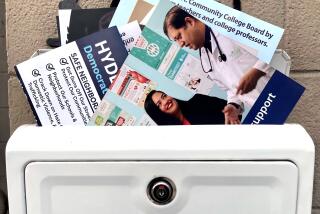Purchasing by Catalogue: Handle With Care
WASHINGTON — The catalogues are flooding into American homes seeking to entice holiday gift dollars on goods not always available in local stores. Shopping by mail can be a convenience, for consumers who know their rights.
The Federal Trade Commission reports that shopping by mail has grown to a $44.4-billion business and is still increasing. The average consumer receives about 50 mail-order catalogues annually.
Most of these companies offer useful goods at competitive prices, but as in any industry, there are problem companies also.
Thus, the trade commission has established some regulations to protect consumers, and assure prompt delivery of ordered goods.
Commission officials point out, though, that the regulations cover products ordered by mail. Telephone orders billed to credit cards are not covered by the regulations, a situation consumers may want to consider when dealing with a firm they are not familiar with.
In addition, the commission’s mail-order regulations do not cover photo-finishing services, magazine subscriptions, cash-on-delivery orders and seeds and plants.
Under the FTC regulations, mail-order firms are required to send goods within a time period specified in their ads, or within 30 days if they don’t specify such a period.
If the company cannot meet that deadline, it has to inform the consumer, and offer a refund if the shopper doesn’t want to wait.
If the shopper decides to cancel the order, the company must send the refund within seven business days, or credit the shopper’s account within one billing cycle.
Some Shopping Suggestions
For consumers shopping by mail, the trade commission has some suggestions:
--Order early to allow plenty of time for shipment. Check the advertising to see if a shipping date is specified.
--Check out the company’s policy on returns. If it is not stated in the advertising, call and inquire before ordering.
--Read all product descriptions carefully, don’t rely solely on pictures.
--Keep a copy of the company’s name, address, date of order, catalogue, order form and canceled checks or charge-account records in the event of problems.
The FTC urges careful checking of credit card bills to make sure the charges cover only items actually purchased, and to make sure that all payments are correctly credited.
If a problem does occur, the consumer should write to the credit card company stating his name and address, account number, the date and amount of the charge being questioned and the reason why the charge is wrong.
Under the Fair Credit Billing Act, the company must reply to the consumer within 30 days, must investigate the problem and either correct the error or explain why the bill is correct within 90 days or two complete billing cycles.
Consumers may withhold payment of the disputed portion of the bill until the problem is resolved, the FTC reports, but they must pay the remainder of the bill. In addition, if it eventually turns out that the charge was correct, the company can charge interest during the period the amount went unpaid.
More to Read
Inside the business of entertainment
The Wide Shot brings you news, analysis and insights on everything from streaming wars to production — and what it all means for the future.
You may occasionally receive promotional content from the Los Angeles Times.










